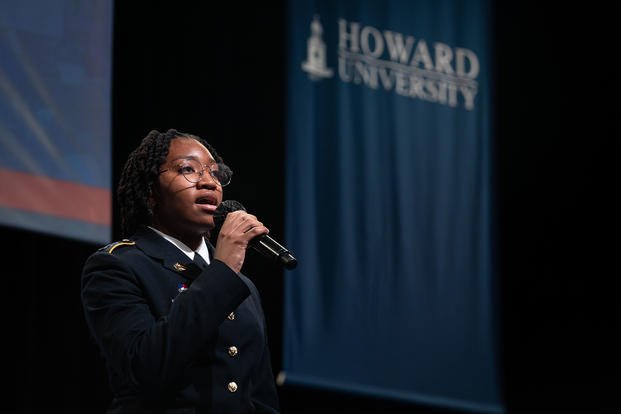A Howard University official has left his job less than two weeks after Military.com published an investigation that found that the school had a long pattern of misfiling paperwork, costing veteran students their GI Bill benefits.
A series of clerical errors culminated in the school being stripped of its accreditation with the Department of Veterans Affairs, temporarily losing its eligibility for new students to use the GI Bill and putting some 235 beneficiaries on campus at risk of being displaced.
After more than two months of uncertainty, student veterans at Howard University now can use their GI Bill benefits again.
The school on Friday announced the suspension had been lifted and that there will be "no restrictions" on VA benefits. Other military scholarships such as National Guard tuition assistance seemingly were not impacted at all by the temporary suspension.
Beyond the certification issue, first reported by Military.com, the publication's investigation found that, for at least a year, staff at Howard mishandled benefits paperwork for student veterans, sometimes leading to benefits being delayed or outright denied. At least one student was forced to move out of Washington, D.C., where the school is located, to seek cheaper housing. And no less than 57 students petitioned the school to waive tuition outright for the previous, current and next semester.
At the center of the certification process was Christopher Rhone, the school's veteran coordinator who served as the middle man between student veterans and the VA. After Military.com's investigation was published, he left the school. Frank Tramble, a university spokesperson, said Rhone's departure is unrelated to the school's handling of military scholarships and subsequent news coverage.
The District of Columbia State Approving Agency, or D.C. SAA, a regulatory arm of the VA, suspended Howard in April from collecting GI Bill benefits from newly enrolled students. Howard officials blamed regulators for not giving school officials adequate warning of changing recertification standards. Yet no other university in the D.C. area was suspended.
Failure to comply quickly with the D.C. SAA's rules could have had further repercussions, including permanent suspension and barring any students from using the GI Bill at Howard.
Such action would have prevented students not only from paying for school, but collecting stipends for books and housing that many rely on to get by. In the D.C. area, where living expenses are some of the highest in the country, that could equal up to $2,000 or more per month. Students also likely would have been forced to find a new school.
Nearly 1 million veterans and eligible family members use the GI Bill yearly. In 2020, the VA paid out $11.4 billion in education benefits. Many advocates and lawmakers see the GI Bill as one of the federal government's most sacred and successful entitlement programs -- serving as a clear path for veterans to the middle class.
Veteran advocates have long beat the drum for the VA to crack down on predatory schools, usually in the for-profit sector. But the D.C. SAA's moves against Howard, one of the most prestigious historically Black colleges in the country, were met with confusion.
According to school officials, regulators took issue with how Howard processed its paperwork when filing for credentials with the VA, which schools typically must do biannually to prove they are in compliance with laws and meet a baseline of standards.
The D.C. SAA did not return requests for comment from Military.com. Multiple employees reached by phone who worked on Howard's suspension case said they were not authorized to talk to the press.
In a statement, a school spokesman said that officials submitted everything they believed was needed for certification, including what led to approval in 2019. A week later, they were informed that "standards for recertification had changed and that our recertification submission was incomplete."
The Fall semester began Monday, but notice on the GI Bill's reapproval did not come until the end of last week. However, tuition was due two weeks ago, and students -- many of whom rely on GI Bill benefits to pay the rent -- had to sign leases for apartments.
It's unclear how long a gap student veterans face to get their first checks from VA for the Fall semester. In the meantime, Howard announced it will not add late fees to tuition.
Officials say the school is "increasing staffing" for veteran needs and offering interest-free loans for up to $3,000, as posted on the school's website. The loans must be paid back by Dec. 14, the end of the Fall semester.
The Protect the GI Bill Act, federal legislation signed into law in January, supercharged protections for student veterans and clarified state approving agencies' authority, making it clear they can cut schools off from GI Bill money.
It is unclear whether the legislation spurred the D.C. SAA to take action against Howard. But given the virtually unheard of move of regulators targeting prestigious schools, it's possible the situation at Howard could be a sign that the new law will lead to further suspensions.
-- Steve Beynon can be reached at Steve.Beynon@military.com. Follow him on Twitter @StevenBeynon.
Related: Errors Cost Student Vets GI Bill Benefits. Now, Howard University Is Scrambling to Save VA Funding













